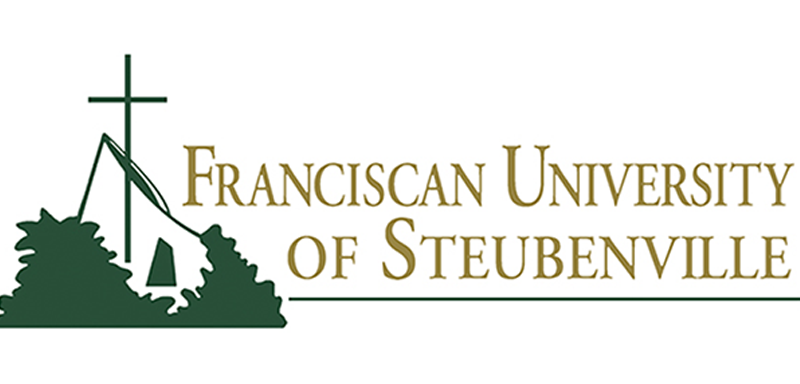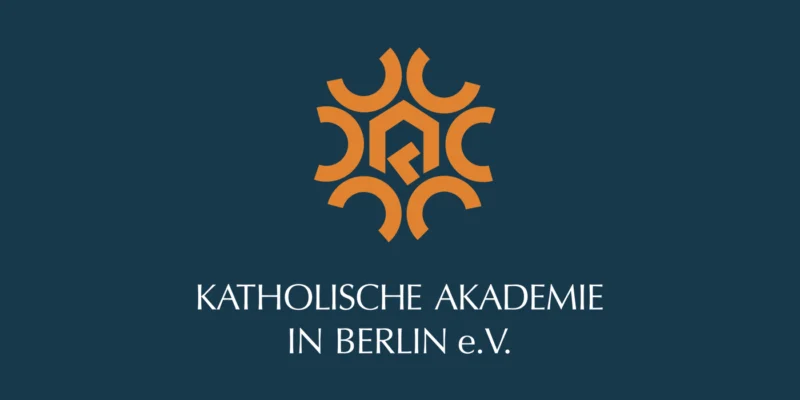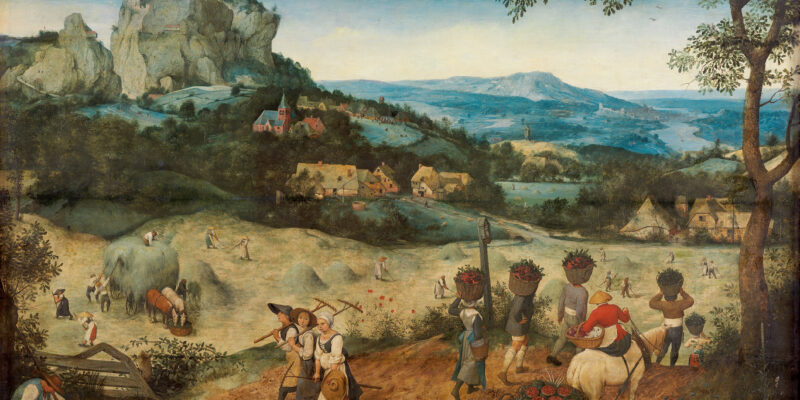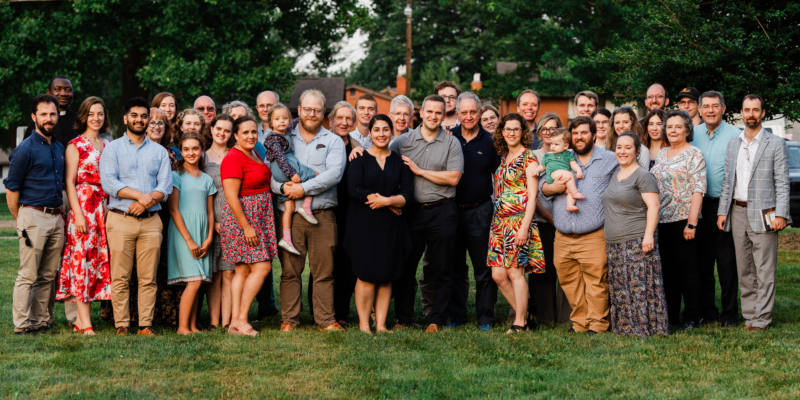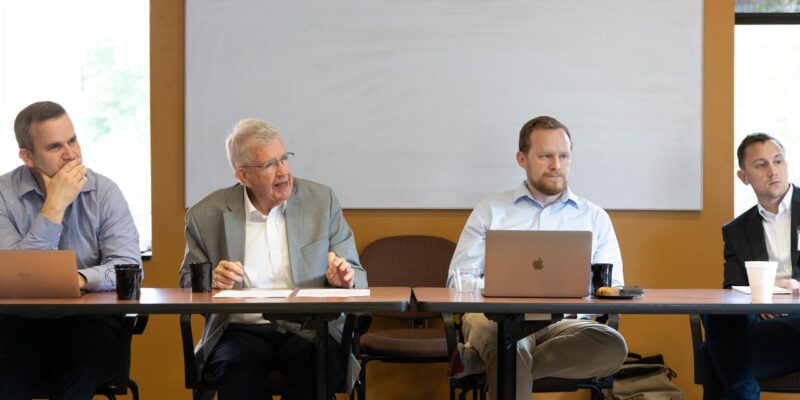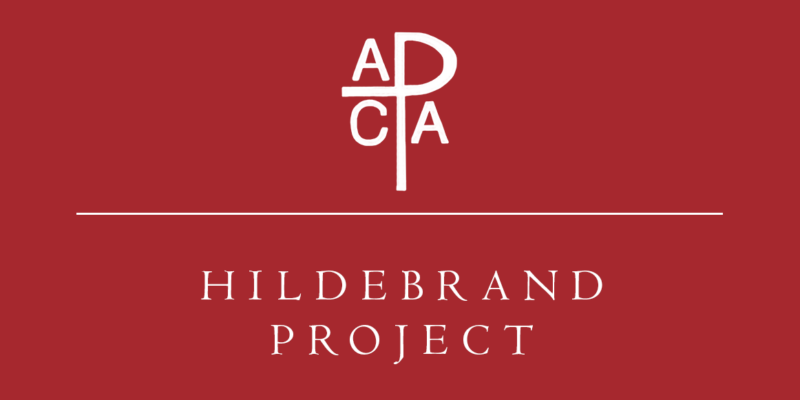Supporting Scholarship
A vital aspect of the Hildebrand Project’s mission is to support scholars working on Dietrich von Hildebrand and other personalist philosophers. This page will provide ongoing resources for new and experienced scholars, from information about our Associated Scholars program, to conference announcements, essay contests, a complete Hildebrand bibliography (to come), and relevant academic opportunities.
This section of our site is still developing, so please be sure to subscribe to our email list and check back regularly for updates. If there is something you, as a scholar, would particularly like to see, let us know.
Scholarly News & Opportunities
17th International Conference on Persons
July 22–26, 2024Catholic Academy in Berlin…
The Challenge of Community
Summer Seminar, Begins July 14, 2024
Summer Residency
Deadline to Apply: February 15, 2024
Personalist Essay Contest
Papers due July 1. Deadline to…
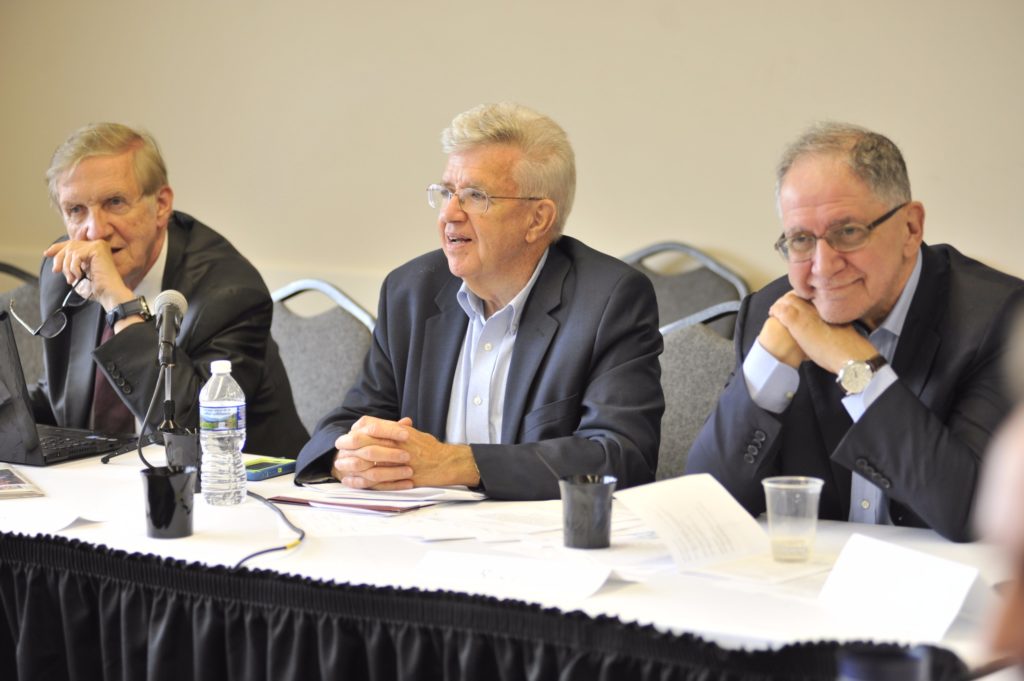
Senior Scholars
Hildebrand Senior Scholars are leading authorities in their fields who work in fruitful collaboration with the Hildebrand Project on topics bringing their own interests in dialogue with Hildebrand’s unique contributions. They regularly present at our seminars, colloquia, and lend their expertise to our summer residency program.

Rocco Buttiglione
Rocco Buttiglione is a philosopher, statesman, and leading European public intellectual. He was a beloved friend and trusted collaborator of Pope St. John Paul II, and is an authority on his philosophical anthropology. His book Karol Wojtyla: The Thought of the Man who became Pope John Paul II is a fundamental work on the pope’s early philosophy. A member of the Italian Parliament for over two decades, he serves on the Pontifical Academy of Social Sciences and holds the John Paul II Chair for Philosophy and History of European Institutions at the Lateran University in Rome. He is a Distinguished Fellow of the Hildebrand Project.

John F. Crosby
Professor Crosby was himself a student of Dietrich Hildebrand. Besides writing major studies on the thought of John Henry Newman, Max Scheler, and Karol Wojtyla/John Paul II, and making his own contributions to personalist philosophy, Prof. Crosby has devoted his long and distinguished academic career—first at the University of Dallas, then at the International Academy of Philosophy, and currently at Franciscan University of Steubenville—to introducing his students to the intellectual legacy of Hildebrand, and also to making Hildebrand better known in scholarly circles. Prof. Crosby was the translator of the English edition of Hildebrand’s philosophical masterpiece, The Nature of Love, and he also serves as the General Editor of all our present and future translations of Hildebrand’s works.

Josef Seifert
Professor Seifert received his doctorate in philosophy from the University of Salzburg in 1969 and, under Professor Robert Spaemann, his habilitation from the University of Munich (Privatdozent) in 1975. He studied chiefly under Balduin Schwarz, the most distinguished German former student of Dietrich von Hildebrand, at the University of Salzburg, and under Gabriel Marcel in Paris. Already as a child (from age 3 on) he knew Hildebrand personally, because Seifert’s mother had been a student of Hildebrand in Munich and both of his parents were Hildebrand’s friends. He is the author of many books, and Europe’s leading student and teacher of Hildebrand’s philosophy.

Associated Scholars
Our Associated Scholars program exists to showcase the depth, range, and versatility of young and mid-career personalist scholars, and to provide Associated Scholars with opportunities for speaking, writing, and other new collaborations, which may include:
- The Hildebrand Project’s new programs of online reading groups and university-based chapters (currently meeting online) introducing college students to personalism through guided discussions and invited lecturers.
- Opportunities to participate in grant applications, such as the National Endowment for the Humanities and the Templeton Foundation, to support new scholarship and events.
- Academic service, such as advising dissertation students, serving as peer reviewers, or vetting manuscripts for publication.
If you would like to learn more about the Associated Scholars program, please email us.
Associated Scholars
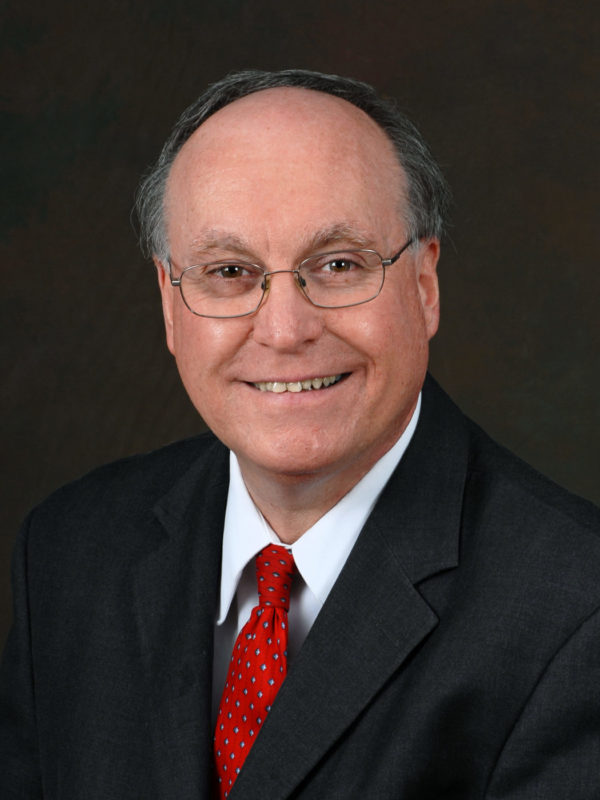
James Beauregard
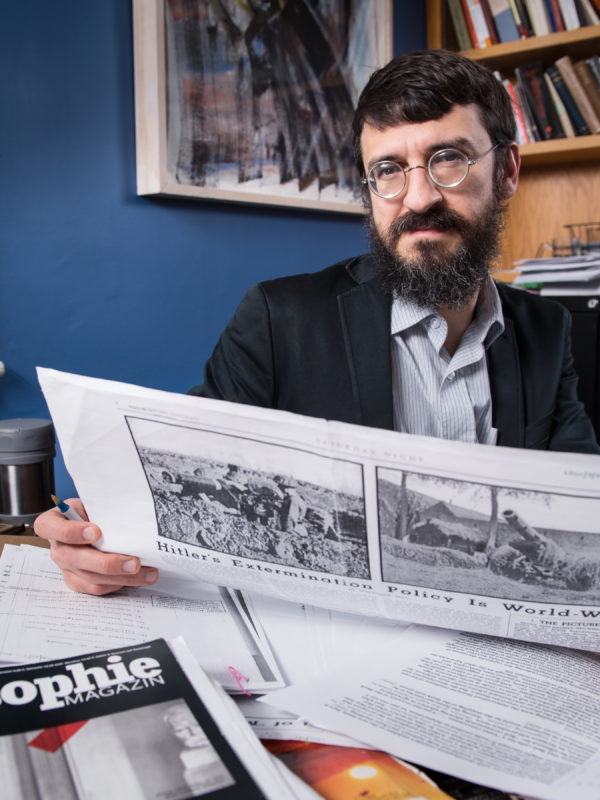
Jason Bell
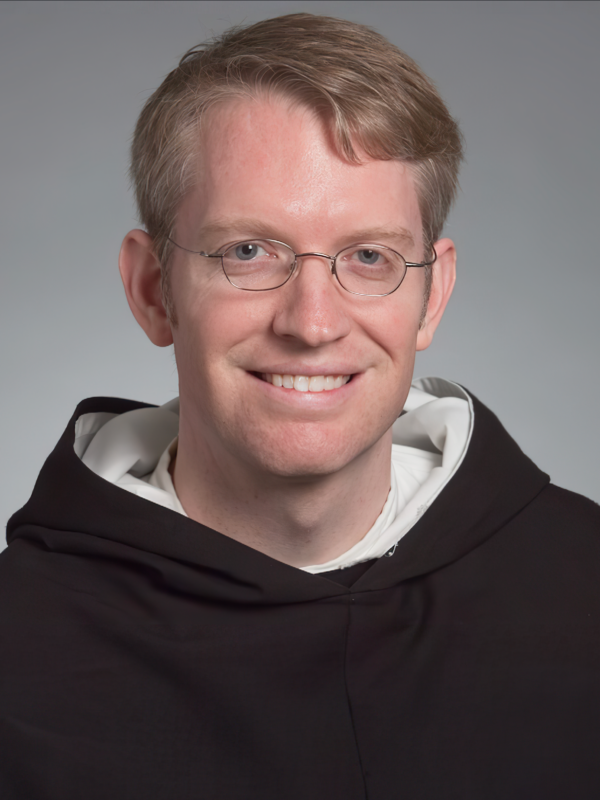
Fr. James Dominic Brent, O.P
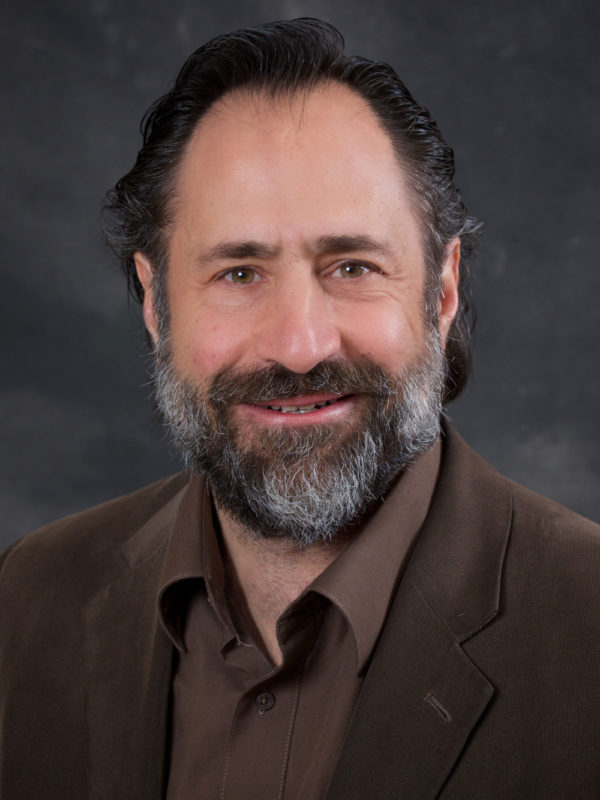
Peter J. Colosi
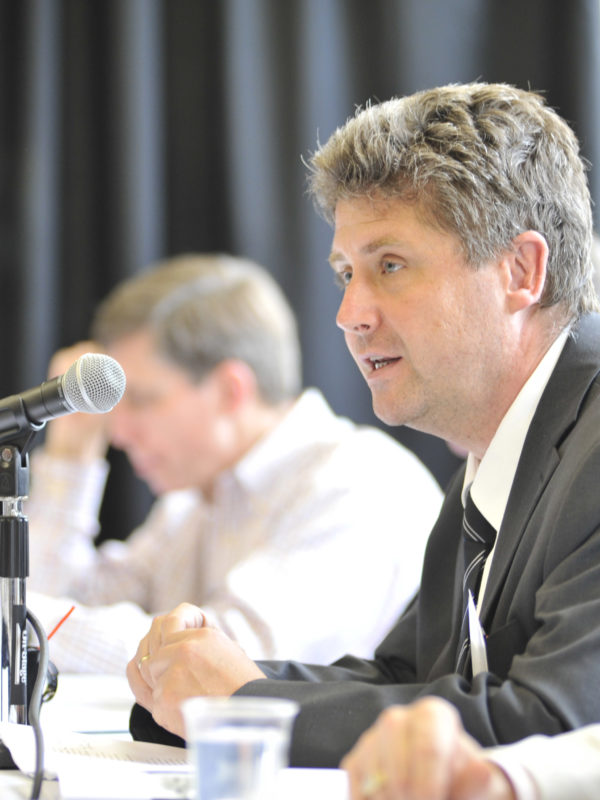
Martin Cajthaml
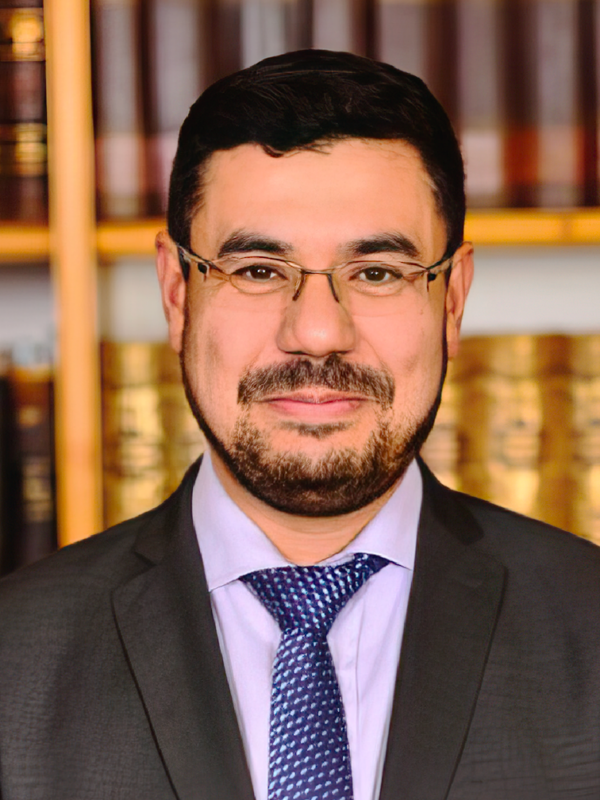
Javier Carreño
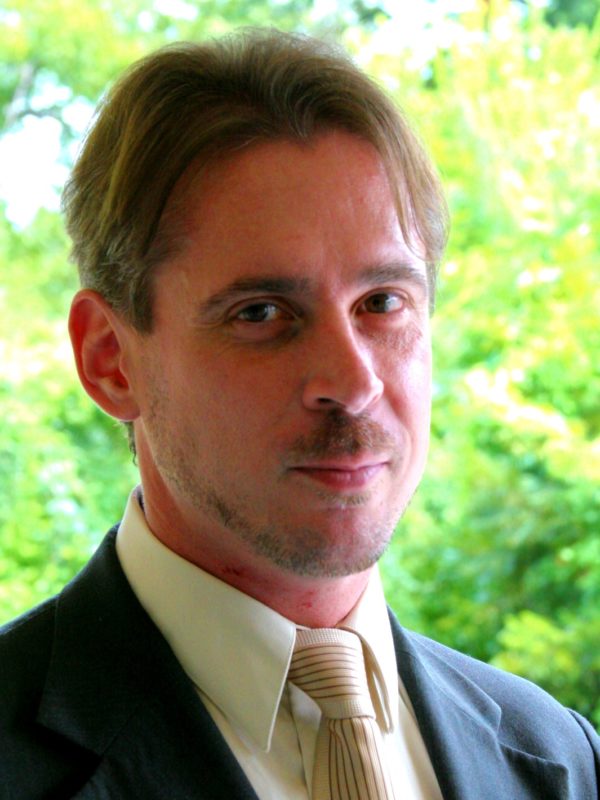
Mario Delucchi
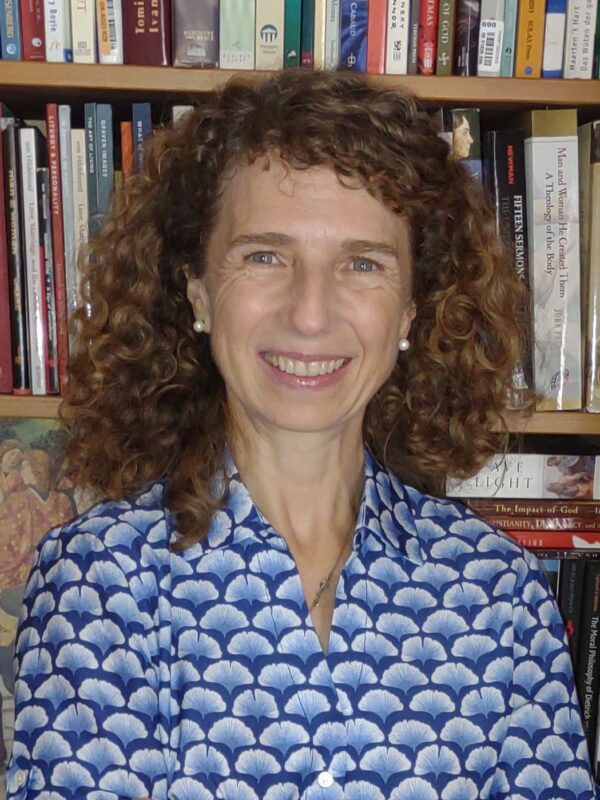
Maria Fedoryka

Thomas V. Gourlay
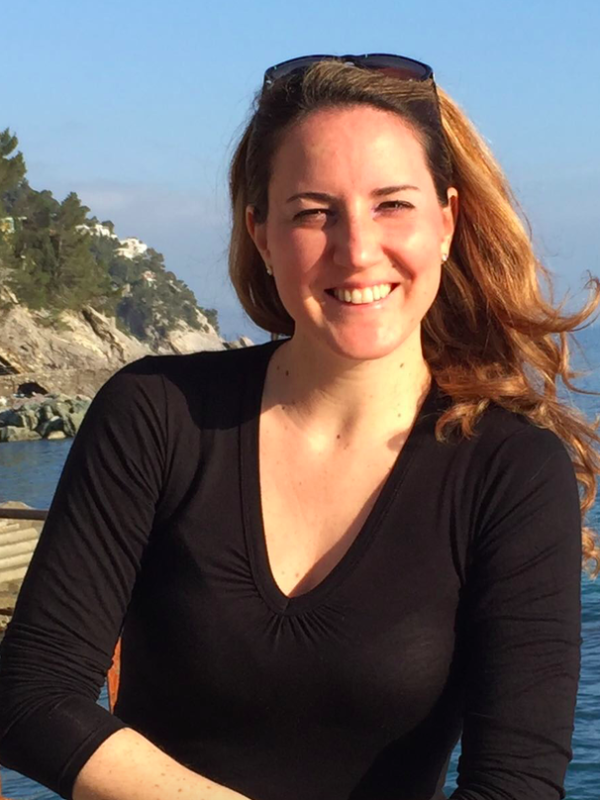
Elisa Grimi
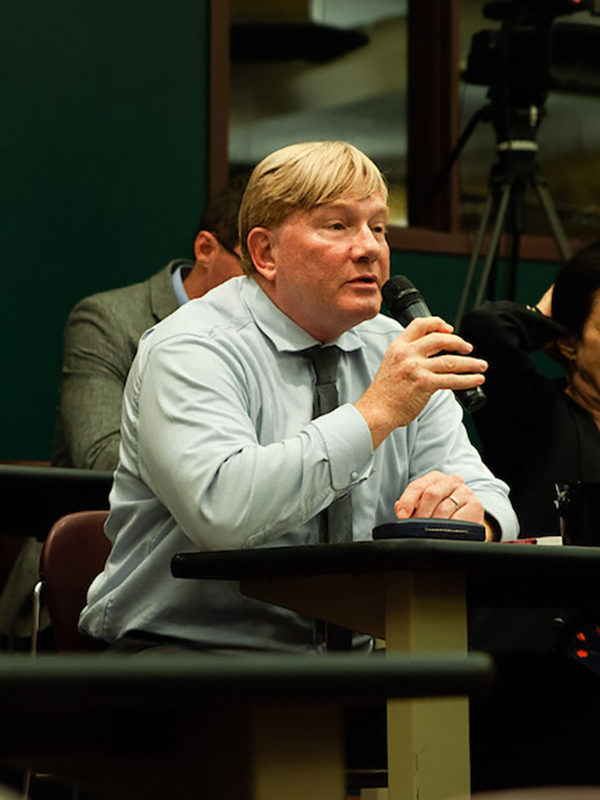
Derek S. Jefferys
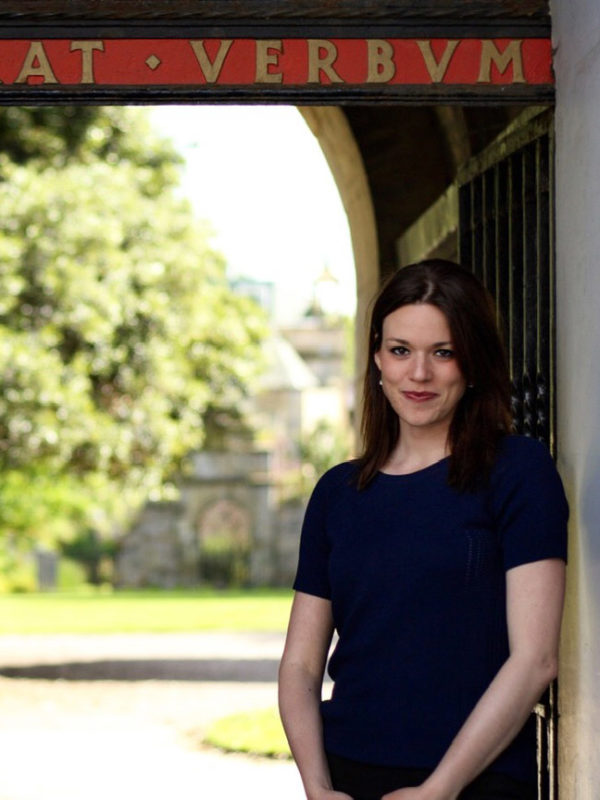
Rebekah Ann Lamb
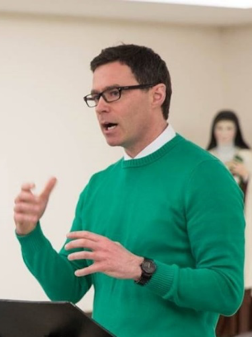
Robert McNamara
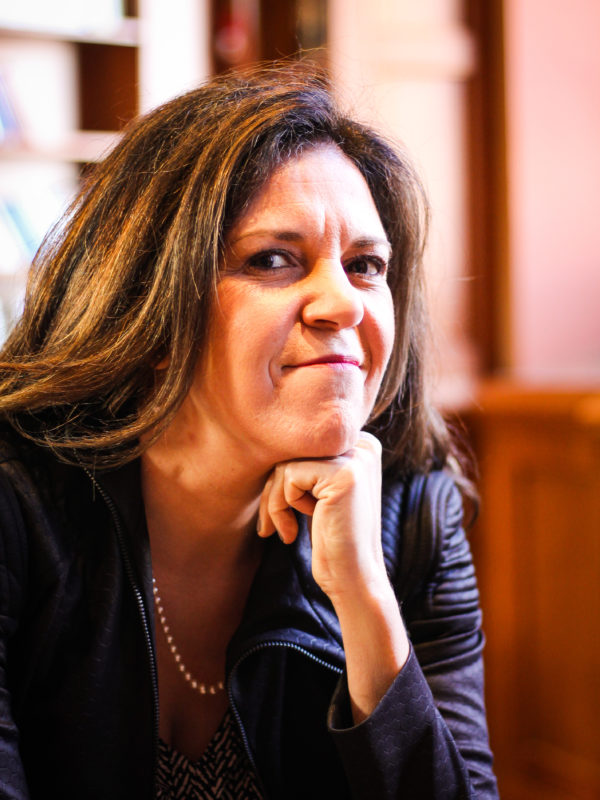
Margarita Mooney
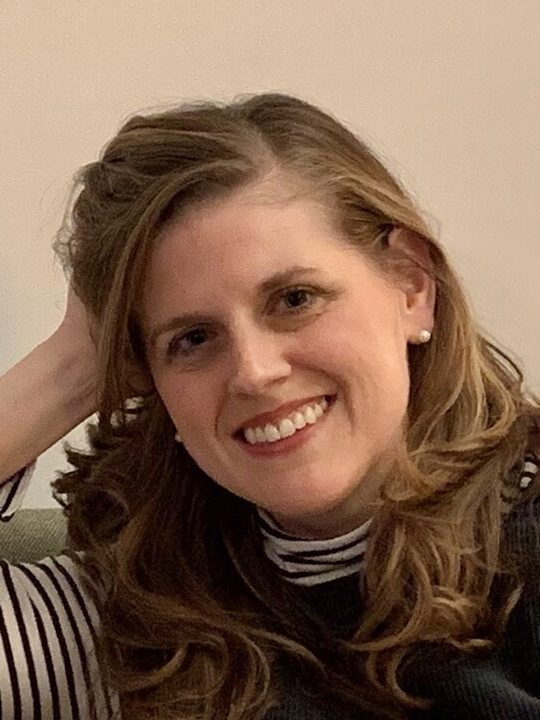
Beth A. Rath
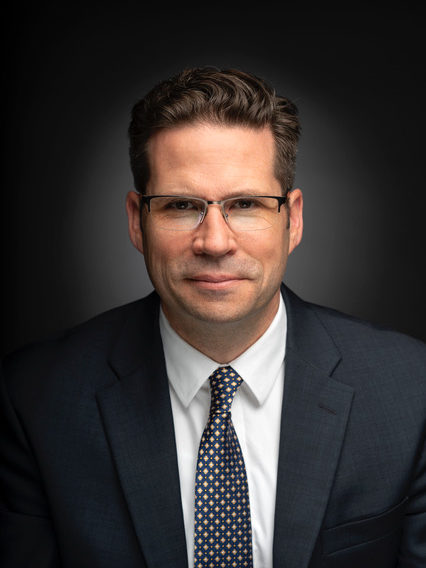
Jonathan J. Sanford
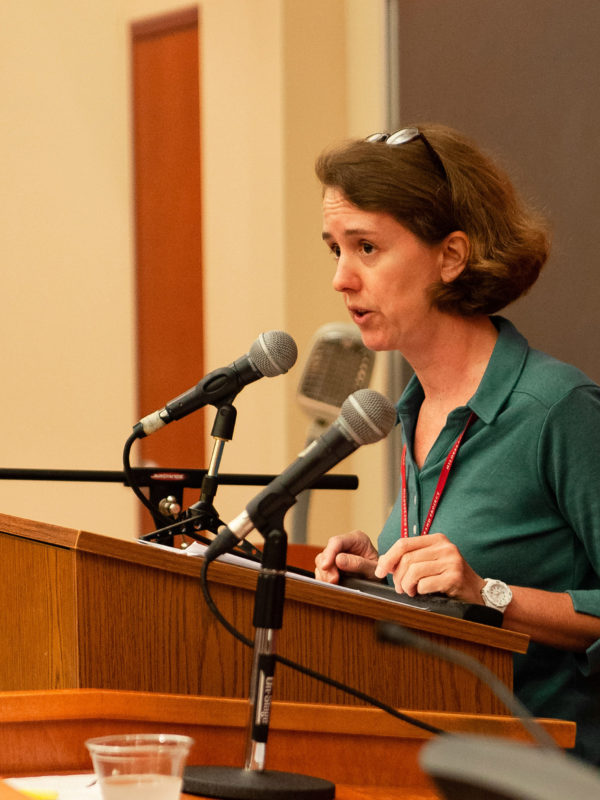
Elizabeth C. Shaw
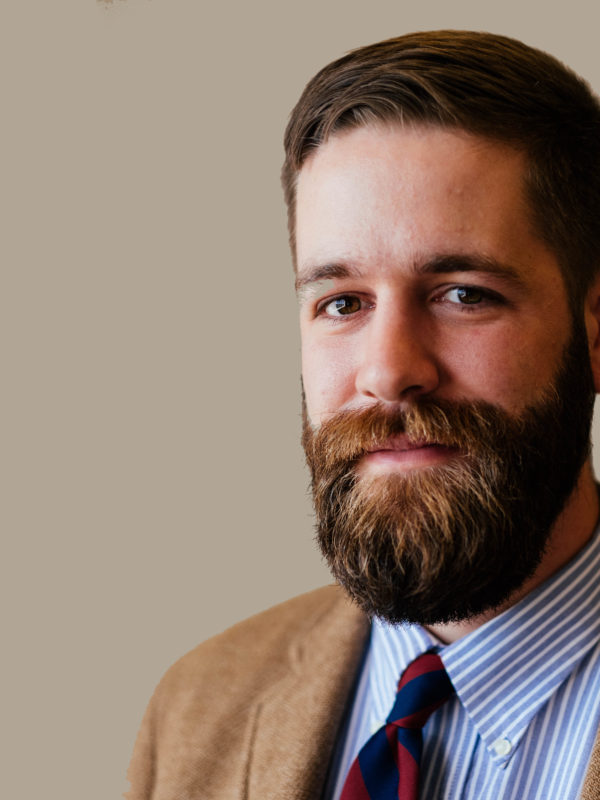
DT Sheffler
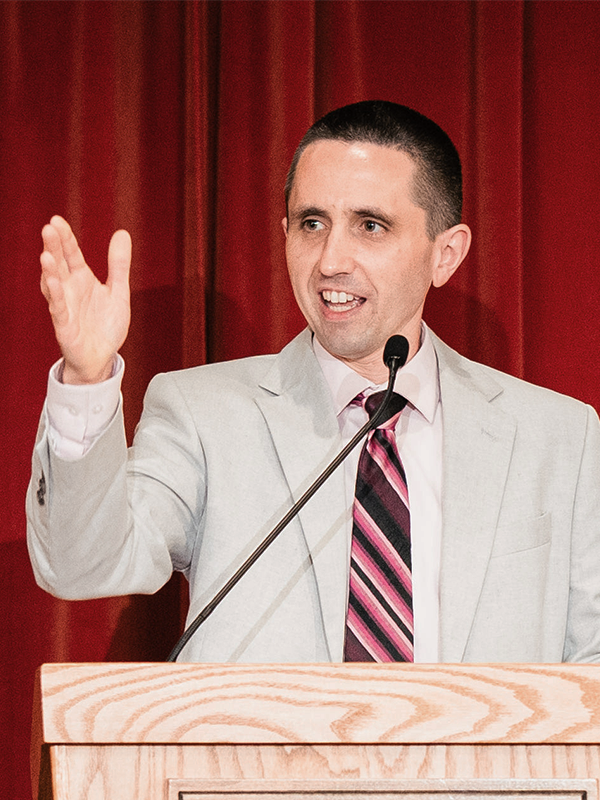
Mark K. Spencer
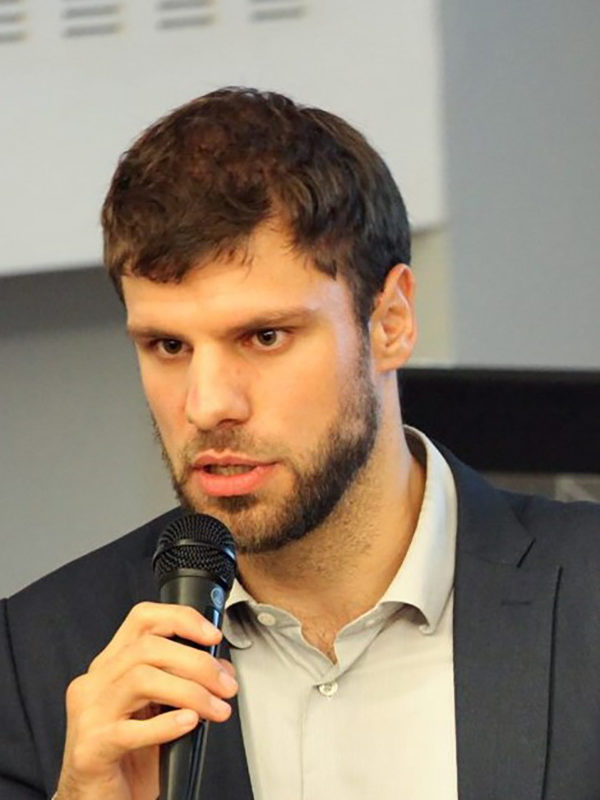
Hrvoje Vargić
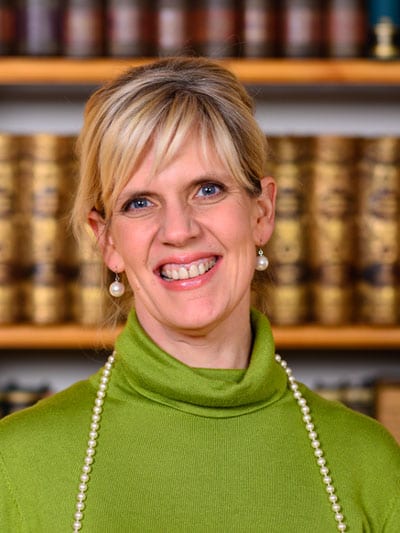
Maria Wolter
No Results Found
James Beauregard
James Beauregard PhD is a Lecturer in the Psy.D. and Ed.D. programs at Rivier University, Nashua, New Hampshire, USA where he teachers Biological Bases of Behavior, Neuropsychology, Educational Neuroscience and Aging. His research interests are in the fields of neuroethics and personalist philosophy, including the intersection of these two areas as they impact our understandings of personhood. He is a member of the International Neuroethics Society, where he serves as a neuroethics expert, the Spanish Personalist Association and the International Conference on Persons (where he serves on the board of directors). His recent publications include Philosophical Neuroethics: A Personalist Approach, Vol. 1, Foundations and the forthcoming Philosophical Neuroethics, Vol. 2: Practical Neuroethics. He is currently working on an educational project in conjunction with a Catholic high school to bring the ethical thought of Dietrich von Hildebrand, as well as other personalist philosophers, into the high school curriculum through writing of a high school Catholic Ethics text and instructional materials. He is also editor of the forthcoming Internet Encyclopedia of Personalism, an online, open access peer-reviewed resource on personalist thought to be launched in 2021. His interest in personalist thought was sparked early in his college days when he first read Karol Wojtyla/Pope John Paul II’s The Acting Person and Redemptor Hominis.
Rivier University
Lecturer, Psy.D. and Ed.D. Programs
Research Areas:
Contemporary European personalist thought, neuroethics, bioethics, personalist psychology, and the ethical vision of Dietrich von Hildebrand
Select Bibliography
Beauregard, James (in press). Philosophical Neuroethics: A Personalist Approach. Vol. 2: Practical Neuroethics. Wilmington DE: Vernon Press.
Beauregard, James. “Integral Personalism and Neuroethics: Informing the Foundation.” Quién, 12 (2020): 79-97.
Beauregard, James. “Forgetting and Remembering Ourselves: Techne, Metaphor and the Unity of Persons,” in J. Beauregard, G. Gallo and C. Stancati, eds., The Person at the Crossroads: A Philosophical Approach. Wilmington, DE: Vernon Press, 2020.
Beauregard, James. Philosophical Neuroethics: A Personalist Approach. Vol. 1: Foundations. Wilmington DE: Vernon Press, 2019.
Beauregard, James (2018). Advancing a Personalist Neuroethics. National Catholic Bioethics Quarterly 18.2 (Summer 2018): 269-290.
Beauregard, James (2018). The Modern Ontological Personalism of Juan Manuel Burgos in the Public Square: Toward a Personalist Neuroethics. Quien 6: 7-31.
Beauregard, James. “Institutions Supported, Institutions Subverted: Thomas O. Buford on the Parables of Jesus” in James M. McLachlan, James Beauregard and Richard Prust, eds., Persons, Institutions and Trust: Essays in Honor of Thomas O. Buford. Wilmington, DE: Vernon Press, 2018.
Beauregard, James. “The Need for a Catholic Neuroethics” Ethics and Medics (National Catholics Bioethics Center), 42 (2017): 12-13.
Beauregard, James and Simon Smith eds. In the Sphere of the Personal: New Perspectives in the Philosophy of Persons. Wilmington, DE: Vernon Press, 2016.
Beauregard, James, M. Aftab, and A. Sajid. “Consciousness, Neuroimaging and Personhood: Current and Future Neuroethical Challenges.” Journal of Cognition and Neuroethics 4, no. 1 (2016): 1–11.
Beauregard, James. Sexuality, Dementia and Catholic Long-term Healthcare. National Catholic Bioethics Quarterly, 15, no. 3 (Autumn 2015): 493-513.
Jason Bell
Jason Bell is associate professor of philosophy at the University of New Brunswick. He has taught in the graduate program at the Higher Institute of Philosophy at the Catholic University of Leuven in Belgium and at Mount Allison University in Canada, and has served at the University of Göttingen as Fulbright Professor, as scholar-in-residence at Boston University, as Onderzoeksfonds Research Fellow at the Husserl Archives, and as d’Alzon Fellow at Assumption University. He was awarded the doctorate in philosophy at Vanderbilt University. His research focuses on ethics and the relation of American and European philosophy.
University of New Brunswick
Assistant Professor of Philosophy
Research Areas:
19th and 20th Century Philosophy: Continental Philosophy, North American Philosophy; Ethics and Applied Ethics; Personalism; Phenomenology; Pragmatism
Select Bibliography
Bell, Jason and Vongehr, Thomas, eds. (2018). Eine kritische Untersuchung der Erkenntnistheorie Josiah Royces (A Critical Investigation of Josiah Royce’s Epistemology), Husserliana (Springer Press).
Bell, Jason and Bogaard, Paul, eds. (2017). The Harvard Lectures of Alfred North Whitehead, 1924-1937: Philosophical Presuppositions of Science. Volume I of the Whitehead Critical Edition, Edinburgh University Press.
Bell, Jason and Parker, Kelly, eds. (2014). The Relevance of Royce, Fordham University Press.
Bell, Jason (2020). “Lotze’s System Σ: An Inspiration for Pragmatic ‘Internal and External Meaning of Ideas’ and Phenomenological ‘Intentionality’?” Phänomenologische Forschungen.
Bell, Jason (2020). “Loyalty to Philosophy” The Pluralist, 15.2.
Bell, Jason and Iyengar, Seshu (2020). “Pure and Applied Trope Theory,” ‘Keynote Author,’ Discipline Filosofiche, XXX, 1, 2020, in the special edition: “Realism, Pragmatism, Naturalism. The Metamorphosis of Phenomenology in North America,” ed. Danilo Manca and Antonio Nunziante.
Bell, Jason (2019). “Phenomenology’s Inauguration in the American Curriculum in Winthrop Bell’s 1927 Harvard Course” in The Reception of Husserlian Phenomenology in North America, Springer Press.
Bell, Jason (2016). “Intellectual and Ethical Inhibition: A Meeting of Pragmatism and Phenomenology,” in Phenomenology for the Twenty-First Century, Palgrave Macmillan.
Bell, Jason (2014). “On Four Originators of Transatlantic Phenomenology: Josiah Royce, Edmund Husserl, William Hocking, Winthrop Bell,” in The Relevance of Royce, Fordham University Press.
Bell, Jason (2012). “Thomas Aquinas and the Origins of Phenomenology” (“Thomas von Aquin und die Anfänge der Phänomenologie,”) in the Edith Stein Jahrbuch, Internationale Edith Stein Institut Würzburg, Germany.
Fr. James Dominic Brent, O.P
Pontifical Faculty of the Immaculate Conception
Assistant Professor of Philosophy
Fr. James Dominic Brent, O.P. was born and raised in Michigan. He pursued his undergraduate and graduate studies in Philosophy and completed his doctorate in Philosophy at Saint Louis University on the epistemic status of Christian beliefs according to Saint Thomas Aquinas. He has articles in the Internet Encyclopedia of Philosophy on Natural Theology in the Oxford Handbook of Thomas Aquinas on “God’s Knowledge and Will”, and an article forthcoming on “Thomas Aquinas” in the Oxford Handbook of the Epistemology of Theology. He earned his STL from the Pontifical Faculty of the Immaculate Conception, and was ordained a priest in the same year. He taught in the School of Philosophy at The Catholic University of America from 2010- 2014 and spent the year of 2014-2015 doing full-time itinerant preaching on college campuses across the United States. He now teaches full-time at the Pontifical Faculty of the Immaculate Conception.
Research Areas:
Epistemology; Aquinas, Knowledge,
Peter J. Colosi
Peter J. Colosi is associate professor of philosophy at Salve Regina University in Newport, Rhode Island, before that having taught at St. Charles Borromeo Seminary in Philadelphia and at the Austrian Program of Franciscan University of Steubenville. He earned his BS in mathematics from Franciscan University, an MA in Franciscan Studies from St. Bonaventure University, and his MPhil and PhD from The International Academy of Philosophy in the Principality of Liechtenstein. Dr. Colosi has published articles, book chapters and pieces in online outlets in areas including philosophical personalism, medical ethics, Catholic social and moral teaching, and Franciscan studies, and is a contributing editor of the Linacre Quarterly. He is co-founder and one of the main organizers of the Theology of the Body International Symposia, of which there have been five thus far, in Austria, Ireland, England, Portugal and Holland. He is a co-founder and co-organizer of and lecturer at the Medical Student and Resident Boot Camp of the Catholic Medical Association which occurs every June and began in 2013, and he is occasionally interviewed on Doctor, Doctor, the official radio program of the Catholic Medical Association, and on Relevant Radio.
Salve Regina University
Associate Professor of Philosophy
Research Areas:
The Body/Soul Question; Philosophical Personalism; Catholic Medical Ethics; Catholic Social and Moral Teaching
Select Bibliography
“The Importance of Philosophical Arguments for the Reality of the Spiritual Soul in Prolife Work.” Life and Learning XXIX, Proceedings of the Twenty-Fifth University Faculty for Life Conference, edited by Joseph W. Koterski, (2019), 107 – 21.
“Discussing the Spiritual Soul in the Classroom.” National Catholic Bioethics Quarterly. 18, no. 3 (2018), 417 – 26.
“The United States Bishops vs. the HHS Contraception Mandate: A Question of Religious Freedom, Moral Truth, or Both?” in Why Humanae Vitae Is Still Right, edited by Janet E. Smith, 327 – 51. San Francisco: Ignatius Press, 2018.
“A Catholic Anthropology and Medical Ethics.” in Catholic Witness in Health Care: Practicing Medicine in Truth and Love, edited by John M. Travaline and Louise A. Mitchell, 31 – 69. Washington, D.C.: Catholic University of America Press, 2017.
“Ratzinger, Habermas and Pera on Public Reason and Religion.” Logos: A Journal of Catholic Thought and Culture 19, no. 3 (2016), 148 – 169.
“Christian Personalism vs. Contemporary Utilitarianism: The Cognitive Dimension of Love and its Relation to Moral Decision Making.” in The Love of Truth: All Truth and in Every Thing. Essays in Honor of Josef Seifert on the Occasion of his 65th Birthday, edited by Carlos A. Casanova, 391 – 406. San Tiago, Chile: Ediciones UC, 2010.
“John Paul II and Christian Personalism vs. Peter Singer and Utilitarianism: Two Radically Opposed Conceptions of the Nature and Meaning of Suffering.” Ethics Education, 15, no. 1 (2009), 20 – 41.
“The Uniqueness of Persons in the Life and Thought of Karol Wojtyła/Pope John Paul II, with Emphasis on His Indebtedness to Max Scheler.” in Karol Wojtyla’s Philosophical Legacy, edited by Nancy Mardas Billias, Agnes B. Curry and George F. McLean, 61 – 100. Washington, D.C.: The Council for Research in Values and Philosophy, 2008.
“Personhood, the Soul and Non-Conscious Human Beings: Some Critical Reflections on Recent Forms of Argumentation within the Pro-Life Movement.” Life and Learning XVII, Conference Proceedings of University Faculty for Life at Villanova University 2007, edited by Joseph W. Koterski, S.J., (2008), 277 – 304.
Professionally recorded lecture: “Body Soul Unity in Human Persons.” Delivered at the 6th Annual Catholic Medical Association Medical Student and Resident Boot Camp (2018). In this lecture I explore the mystery of the union of body and soul in human persons and mention many of the early and contemporary personalists throughout.
Martin Cajthaml
Cajthaml studied philosophy at the Faculty of Arts of the Charles University in Prague from 1991-1993. He went on to study philosophy and psychology at the International Academy of Philosophy in the Principality of Lichtenstein (IAP). In 2000, he earned his PhD in philosophy at the IAP with the dissertation Kritik des Relativismus. In 2000-2007 he worked as assistant-professor at the IAP. He is a full professor and the Head of the Department of Philosophy and Patrology at the Sts Cyril and Methodius Faculty of Theology of Palacky University Olomouc, Czech Republic.
Palacký University Olomouc
Associate Professor of Philosophy
Research Areas:
Philosophical Ethics; Intellectual and Spiritual Roots of European Culture; Value Theory
Select Bibliography
Cajthaml, M., Vohánka V. The Moral Philosophy of Dietrich von Hildebrand . Washington: Catholic University of America Press, 2019.
Cajthaml, M. “Dietrich von Hildebrand’s Moral Epistemology.” American Catholic Philosophical Quarterly 92, no. 4 (2018): 615-640
Cajthaml, M. “Von Hildebrand on Acting against One’s Better Knowledge: A Comparison with Plato.” American Catholic Philosophical Quarterly 91, no. 4 (2017): 637–653.
Cajthaml, M. “Von Hildebrand’s Concept of Value.” Studia Neoaristotelica 15, no. 1 (2018): 95-130.
Cajthaml, M. “Love as a Value Response. Von Hildebrand´s Philosophy of Love.” Reflexe 39 (2010): 19-33.
Cajthaml, M. “Moral Virtue according to von Hildebrand with Respect to Aristotle.” Reflexe 43 (2012), 59-78.
Cajthaml, M. “The Moral Value of Emotions in Respect to Aristotle, Kant, and von Hildebrand.” Studia Neoaristotelica 12, no. 3 (2015): 5-25.
Cajthaml, M. “Value Blindness according to von Hildebrand.” Studia Neoaristotelica 2 (Series bohemoslovaca), no. 5/3 (2017): 39-67.
Cajthaml, M. “Love as Desire of the Good or Love as Value-Response? Plato and von Hildebrand on the Essence of Love.“ AITHÉR, no. 4 (2016): 54-65.
Javier Carreño
Javier Carreño is Professor of Philosophy and Chair of Faculty at Franciscan University
of Steubenville’s study abroad program located in Gaming, Lower Austria.
Since 2011 he has offered undergraduate as well as graduate courses in various
philosophical disciplines – including Aesthetics – as well as in English literature, Visual
Arts, Theology, and Honors. For a few years now he has also led reading groups for the
Hildebrand Project, of which he is an Associated Scholar.
Javier is primarily a scholar of Edmund Husserl’s work (esp. Phantasy and Image-
Consciousness), and in his articles he explores its significance for current questions in
Aesthetics and the Philosophy of Religion. He is also co-editor (with Kasia Dudek) of a
volume on the Phenomenology of Christian Imagination, to appear later this year
published by Bloomsbury.
Javier received his education at the University of Dallas, where he obtained a B.A. in
Philosophy and English, and then at the Katholieke Universiteit Leuven, where he
obtained both an M.A. as well as a Ph.D. in philosophy.
Originally from Bucaramanga, Colombia, Javier is married to Bea, from Hungary.
Together they are blessed with four children.
Select Bibliography
“Husserl and Dufrenne on the Temporalization of Image Space” Anuario Filosófico vol. 51/2, pp. 301-323
“Religious Experience and Photography: The Phenomenology of Photography as Revelatory of the Religious Play of Imagination.” De Gruyter Open Theology vol. 3, pp. 224-234.
“Seeing Temporality in Still Images: A Phenomenological View.” In Humanities Across the Borders: More Interdisciplinary Issues, ed. E. Hornackova Klapicova and E. Smetanova (Madrid: Ediciones Xorki) pp. 317-329.
Mario Delucchi
Mario Delucchi is a doctoral candidate in philosophy at the University of Dallas, where he teaches ethics and metaphysics. He likes to cast his net across philosophical paradigms, seeking ways to overcome impasses between schools and traditions (without compromising eternal verities and values.) Nevertheless, his penchant for exploring concrete human themes through the phenomenological method draws him especially to phenomenological, existentialist, and personalist thought. Here, Dietrich von Hildebrand has been a long-time companion. Mario strives to resist rigid partitions between disciplines in order to emphasize the mutually reinforcing relationship between metaphysics, ethics, and aesthetics, for the sake of that ancient trinity: the true, good, and beautiful. He also never ceases to find fulfillment in teaching, and midwifing the philosophical insights of undergraduates has proven to be a constant source of inspiration. A convert in two senses, he was introduced many years ago to Catholicism, through the sublime beauty of its music and architecture, by a close friend and mentor who also taught him how to see and think phenomenologically. For Mario, faith, reason, and a sense for the beautiful thrive together, ever since they awoke together many years ago. He currently resides with his wife Lauren in Bedford Texas.
University of Dallas
Doctoral Candidate and Philosophy Professor
Research Areas:
Personalism (broadly construed), phenomenology (especially the Munich school), existentialist thought, philosophical aesthetics, Maurice Blondel, Robert Spaemann, Plato, Aristotle, and Aquinas.
Maria Fedoryka
Dr. Maria Fedoryka lectures and publishes in both academic and popular fora in the field of the philosophy of love, examining issues spanning from the centrality of love in the being of God, to its role at the center of creation, to its meaning for marriage, family, and sexuality. Having been captivated by the writings of Dietrich von Hildebrand as a teenager and deeply drawn to his phenomenological and personalist philosophy, she pursued her studies under Josef Seifert and John Crosby at the International Academy of Philosophy. Among her scholarly writings are an analysis of Dietrich von Hildebrand’s philosophy of marital intimacy and procreation titled Finis superabundant Operis: Refining an Ancient Cause for Understanding the Spousal Act in the ACPQ, and “‘God is Love’”: Personal Plurality as the Completion of Aristotle’s Notion of Substance and Love as the Absolute Ground of the Divine Being” in the Proceedings of the ACPA. Among her popular publications are the booklet The Special Gift of Women for God, the Family and the World published by the Catholic Truth Society in England. She is currently working on an article comparing Hildebrand’s and Aquinas’s philosophy of affectivity, as well as an article on Hildebrand’s theory of motivation as the key to understanding deliberate moral wrongdoing.
Ave Maria University
Associate Professor
Research Areas:
Philosophy of Love
Select Bibliography
“A Comparison of Aquinas on the Passions and Affectiones and Hildebrand on ‘Genuinely Spiritual Affectivity’”. Paper delivered at Colloquium on the Heart sponsored by the Hildebrand Legacy Project. University of Dallas, February 2020
“Is Moral Evil Only Privation? Another Look”. Paper delivered at The True, the Good, and the Beautiful – and the Encounter with Evil Fellowship of Catholic Scholars Annual Convention. Montreal, Quebec, September 2019
Forthcoming: “Does Gender Matter for Marriage? The Centrality of Masculinity and Femininity to Marriage as Mutual Self-Gift in the Theology of the Body” in Dutch Communio, proceedings of the 5th International Theology of the Body Symposium, Kerkrade: 2019
Book review for Review of Metaphysics of Dietrich von Hildebrand’s Graven Images
“‘God is Love’: Personal Plurality as the Completion of Aristotle’s Notion of Substance and Love as the Absolute Ground of the Divine Being” in Proceedings of the American Catholic Philosophical Quarterly 2019
“Human Sexuality: The Battle for the Human Soul” in Mary and the Crisis in the Church, ed. Roger Nutt. Sapientia Press: 2019
“Von Hildebrand, Love and Contraception”, in Humana Vitae, 50 Years Later: Embracing God’s Vision for Marriage, Love, and Life, ed. Theresa Notare. CUA Press: 2019
“Only Union Plus Love Equals Fruitfulness: A Personalist Reflects on the Teaching of Humanae Vitae” in Why Humanae Vitae is Still Right, ed. Janet Smith. Ignatius Press: 2018
“Finis Superabundant Operis: Refining an Ancient Cause for Explaining the Conjugal Act” in American Catholic Philosophical Quarterly, Vol. 90, no. 3, 2016, 477-498
The Special Vocation of Women: for God the family and the World, Catholic Truth Society Publications, United Kingdom: 2010
Thomas V. Gourlay
Tom is the manager of Campus Ministry/Chaplaincy, lecturer, and PhD candidate in the School of Philosophy & Theology at the University of Notre Dame Australia. Prior to his work in Campus Ministry/Chaplaincy, he worked as a classroom teacher and faculty head of Religious Education in Catholic secondary schools in Western Australia.
He holds Bachelors and Masters Degrees in education, and a Graduate Certificate in Liberal Arts from the University of Notre Dame Australia. Tom also holds a Masters of Theological Studies (MTS) from The John Paul II Institute for Marriage and Family Studies in Melbourne, Australia.
Tom is also the managing editor of Macrina Magazine, and the president and co-founder of The Christopher Dawson Society for Philosophy and Culture (Inc.), a not-for-profit association, founded to organise and promote cultural & philosophic activities that recognise the spiritual, as well as the material, element in our nature & in society more broadly.
Tom and his wife Elizabeth have three children live in Perth Western Australia.
The University of Notre Dame Australia
Lecturer, School of Philosophy & Theology; Manager, Chaplaincy
Research Areas:
Theological anthropology, Natural Law, Faith and Culture, Theological critiques of liberalism, Catholic education
Select Bibliography
Books:
1968: Culture and Counterculture – A Catholic Critique. Thomas V. Gourlay and Daniel Matthys, eds. Wipf & Stock: Pickwick.
Book Chapters:Gourlay, Thomas V., ‘Catholic Inc.: On the Mechanised, Bureaucratised Body of Christ’ in Ecclesiology at the Beginning of the Third Millennium, Kevin Wagner, M. Isabell Naumann, Peter John McGregor, Paul Morrissey eds., Wipf & Stock. (2019)
Journal Articles:
Gourlay, Thomas V., “Pluralism in Theology According to Rahner and Ratzinger: Symphony or Cacophony?”, Heythrop Journal: Vol. 62, Issue 1.
Gourlay, Thomas V., “The Nature of Nature: Concerning the Efficacy of Natural Law Reasoning”, New Blackfriars Review: Vol. 100, Issue 1089.
Gourlay, Thomas V., “Theological Foundations of Pastoral Care in Catholic Universities,”eJournal of Catholic Education in Australasia: Vol. 3 : Issue 1 , Article 6.
Gourlay, Thomas V., “Nature, Grace, and Catholic engagement in contemporary cultural debate,” New Blackfriars Review: Vol. 100, Issue 1085.
Gourlay, Thomas V., “The Nuptial Character of the Relationship between Faith and Reason in the thought of Joseph Ratzinger/Benedict XVI”, Heythrop Journal: Vol. 59, Issue 2.
Book Reviews:
Gourlay, Thomas V. (2018) “Book Review: God and Eros: The Ethos of the Nuptial Mystery,” Reviewed in Claritas: Journal of Dialogue and Culture: Vol. 7 : No. 1 , Article 14.
Gourlay, Thomas V. (2018) “Book Review: Torn Asunder: Children, the Myth of the Good Divorce, and the Recovery of Origins.” By Margaret Harper McCarthy, ed., Reviewed in Homiletic and Pastoral Review.
Gourlay, Thomas V. (201) “Book Review: Liturgy and Personality.” By Dietrich von Hildebrand. Review in The Downside Review: Vol 136, Issue 2, 2018.
Gourlay, Thomas V. (2018) “Book Review: Mystery and Sacrament of Love: A Theology of Marriage and the Family for the New Evangelization”, by Cardinal Marc Ouellet. Reviewed in Homiletic and Pastoral Review.
Elisa Grimi
Elisa Grimi is Executive Director of the European Society for Moral Philosophy and the Editor-in-Chief of the international journal Philosophical News. On May 30, 2014, she received the Paolo Michele Erede Foundation First Prize with a work on “Politics and Network”. She has studied and worked at various universities throughout the world, in countries including Italy, Switzerland, Austria, Germany, England, France, and the United States. She is the author of numerous publications.
The European Society for Moral Philosophy
Executive Director
Research Areas:
Ethics, Moral Philosophy, Philosophy of Religion, Analytic Philosophy
Select Bibliography
D. von Hildebrand. L’arte del vivere. Introduction by E. Grimi. Preface by J.F. Crosby. Morcelliana, 2022.
D. von Hildebrand. Mozart, Schubert, Beethoven. Afterword by E. Grimi. Abscondita, 2022.
E. Grimi. Epistemologia della morale nel pensiero di Dietrich von Hildebrand. Con un saggio di Dietrich von Hildebrand “La detronizzazione della verità.” Mimesis, 2020.
E Grimi, “Ritorno a Dio. Bonaventura e von Hildebrand”. Vivens Homo, 31/2, Dehoniane, Bologna.
E. Grimi (ed.). Romano Guardini, modernità e post-modernità. Stamen 2nd ed. 2020.
E. Grimi (ed.). Virtue Ethics. Retrospect and Prospect. Springer, 2019.
E. Grimi – L. Di Donato. Metaphysics of Human Rights 1948–2018: On the Occasion of the 70th Anniversary of the UDHR . Vernon Press, 2019.
E. Grimi (ed.). “Dietrich von Hildebrand and Christian Personalism”. Philosophical News, N. 16, July 2018, Mimesis International, Milan-London.
E. Grimi. G.E.M. Anscombe. Guida alla lettura di Intention. Carocci, 2018.
E. Grimi (ed.). Dossier La philosophie de l’humilité. Recherches Philosophiques, ICT, 2017.
E. Grimi – R. Brague. Contro il cristianismo e l’umanismo. Il perdono dell’Occidente. Cantagalli, 2016.
E. Grimi (ed.). Tradition as the Future for Innovation. Cambridge Scholars Publishing, 2015.
E. Grimi. G.E.M. Anscombe: The Dragon Lady. Edizioni Cantagalli, 2014.
Derek S. Jefferys
Derek S. Jeffreys is a professor of Humanities, Religion and Philosophy at the University of Wisconsin, Green Bay. He did both his B.A. and Ph.D. at the University of Chicago. He has written books on St. John Paul II, ethics and torture and ethics and solitary confinement. His most recent book is America’s Jails: The Search for Human Dignity in An Age of Mass Incarceration. Jeffreys teaches courses on love, Thomas Aquinas, ethics, ethics and punishment, evil, Dante, Buddhism, and other topics. For more than a decade he has been involved in jail and prison education, giving volunteer religion and philosophy lectures to inmates in Wisconsin’s jails and prisons. He is married and proud father of twin boys.
University of Wisconsin, Green Bay
Professor
Research Areas:
Personalism, Personalism and Violence, Personalism and Incarceration
Select Bibliography
Jeffreys, Derek S. Defending Human Dignity: John Paul II and Political Realism . Grand, Rapids, MI: Brazos Press, 2004.
Jeffreys, Derek S. Spirituality and the Ethics of Torture. New York, NY: Palgrave Macmillan, 2009.
Jeffreys, Derek S. Spirituality in Dark Places: The Ethics of Solitary Confinement. New York, NY: Palgrave Macmillan, 2013.
Jeffreys, Derek S. America’s Jails: The Search for Human Dignity in an Age of Mass Incarceration. New York, NY: New York University Press, 2018.
Jeffreys, Derek S. “Personalists are not Kantians: Robert Kraynak and the Value of the Person,” Journal of Markets and Morality 7, no. 2 (October 2004): 507-516.
Jeffreys, Derek S. “Ignoring Thomistic Metaphysics: A Reply to Robert Kraynak,” Journal of Markets and Morality 7, no. 2 (October 2004): 527-531.
Jeffreys, Derek S. “Cruel but not Unusual: Derek Jeffreys on Solitary Confinement,” Commonweal, June 13, 2014: 20-23.
Jeffreys, Derek S. C-Span Book Interview on Spirituality in Dark Places: The Ethics of Solitary Confinement, September 23, 2014.
Rebekah Ann Lamb
Dr Lamb recently joined the School of Divinity at the University of St. Andrews as a Lecturer in Theology and the Arts, teaching many of the courses run out of the School’s Institute of Theology, Imagination and the Arts. Prior to her move to the ancient kingdom of Fife, she was an inaugural Gilson Post-Doctoral Fellow at the University of St. Michael’s College, within the University of Toronto. She also lectured at Our Lady Seat of Wisdom College in Barry’s Bay (Ontario).
She has recently published on Christina Rossetti, George MacDonald, Dietrich von Hildebrand, Fyodor Dostoevsky and Victorian Anglo-Catholicism. She is currently completing a book, under contract with McGill-Queen’s University Press, on the theological and aesthetic implications of boredom, with special emphasis on the Victorian period and the early twentieth century. She is currently co-editing a special issue with Religion and Literature on John Henry Cardinal Newman, to commemorate his recent canonisation, and is a collaborator on the Tree of Tales Exhibition on Tolkien, a partnership between the University of St Andrews and the Rimini Meeting.
Dr Lamb teaches on a wide range of subjects, from The Book of Genesis to Black Mirror, and recently co-designed and co-taught a new course on The Imagination in Theology and Science at the University of St. Andrews. She teaches graduate courses on Practical Criticism, Christian Doctrine and the Arts, and Theology and the Arts, with emphasis on Dietrich von Hildebrand, among others.
She has taught and lectured on both sides of the Atlantic, in the States, Canada, Rome, England, and Scotland. She recently appeared on BBC One’s Reflections at the Quay, contributed to the Narnia Lenten Lecture Series at the McGrath Institute for Church Life (University of Notre Dame), and frequently writes for public-facing journals such as Convivium: Faith in Our Common Life, The Catholic Herald, Transpositions, and The Scottish Catholic Observer, among others.
University of St. Andrews, School of Divinity
Lecturer in Theology, Imagination and the Arts
Research Areas:
Religion and Literature; Aesthetics; Victorian and Modernist Studies; Christian Personalism; Practical Criticism
Select Bibliography
Review of Morality and Situation Ethics and Graven Images: Substitutes for True Morality for New Blackfriars. Forthcoming, 2020.
‘The Personhood of the Liturgy’. Review essay on Liturgy and Personality for Convivium: Faith in Our Common Life. 1 August 2016.
‘Literature and the Question of Magnanimity: Hildebrand and O’Connor Revisited.’ Article, in progress.
Robert McNamara
Robert is an Associate Professor of Franciscan University of Steubenville, where he teaches philosophy and theology, an associate member of faculty of the International Theological Institute and the Maryvale Institute, an Associated Scholar of the Hildebrand Project, and a founding member of the Aquinas Institute of Ireland, for which he currently holds the position of secretary. Robert was educated at the National University of Ireland Galway, where he studied physics and applied science, Maynooth University and St. Patrick’s College, where he studied philosophy and theological studies, the International Theological Institute, where he received a master’s degree in the theology of marriage and family, and Liverpool Hope University, where he completed a doctorate of philosophy detailing Edith Stein’s engagement with the thought of Thomas Aquinas in her mature philosophy of the human person. Robert is originally from Galway, Ireland.
Franciscan University of Steubenville
Assistant Professor of Philosophy
Research Areas:
Ethics, Moral Philosophy, Metaphysics, Personalism, Edith Stein, Thomas Aquinas (Thomism)
Select Bibliography
‘The Concept of Christian Philosophy in Edith Stein’, in American Catholic Philosophical Quarterly, 94.2 (2020), pp. 323-46.
‘The Cognition of the Human Individual in the Mature Thought of Edith Stein’, in Philosophical News, a Publication of the European Society for Moral Philosophy, ed. Elisa Grimi, 16 (forthcoming).
‘Human Individuality in Stein’s Mature Works’, in Edith Steins Herausforderung heutiger Anthropologie, ed. by Hanna-Barbara Gerl-Falkovitz and Mette Lebech (Heiligenkreuz: Be&Be, 2017), pp. 124-39
‘Essence in Edith Stein’s Festschrift Dialogue’, in Alles Wesentliche lässt sich nicht schreiben, ed. by Andreas Speer and Stephen Regh (Freiburg i. Br.: Herder, 2016), pp. 175-94. Paper Presentations:
‘Edith Stein’s Understanding of Human Flourishing’, St. Saviour’s Symposium, Dominican House of Studies, Dublin, Ireland (2020).
‘Edith Stein’s Understanding of Human Unity and Bodily Formation’, 5th biennial International Conference of the International Association for the Study of the Philosophy of Edith Stein (IASPES), University of Cologne, Cologne, Germany (2019).
‘Edith Stein’s Understanding of the Soul as Form of the Body’, The International Theological Institute, Trumau, Austria (2018).
‘The Cognition of the Human Individual’, Catholic University of America, Washington, DC, U.S.A. (2018).
‘Individuality in Stein Reading Aquinas’, 3rd biennial International Conference of the International Association for the Study of the Philosophy of Edith Stein (IASPES), University of Vienna, Austria (2016).
‘Essence in Husserl and Aquinas’, International Conference: ‘What’s essential can’t be written: Edith Stein’s Life and Thought as reflected in her oeuvre’, University of Cologne, Cologne, Germany (2014).
Margarita Mooney
Margarita Mooney is currently an Associate Professor at Princeton Theological Seminary and founder and executive director of Scala Foundation, a nonprofit dedicated to reinvigorating classical liberal arts education and preserving the ideas and practices necessary to maintain a free society. Scala’s conferences, colloquia, reading groups, dinner seminars and travel events emphasize hospitality and friendship, aiming to help students connect their intellectual development with character formation and generating transformative educational experiences and authentic friendships. Begun in 2016, Scala has become a movement to transform education and has built networks with students, educators and partner organizations in various locations around the world.
As a woman whose work lies at the intersection of the social sciences with philosophy and theology, she excels at encouraging students, readers, listeners and audiences to think about important questions in culture, education and faith in new and different ways. She is a frequent speaker to women’s organizations, think tanks, schools, church groups and a variety of other nonprofits as well as businesses about faith and values. In addition to her scholarly books and articles, she has written for publications that reach wide audiences both inside and outside academia such as Real Clear Policy, Scientific American, Public Discourse, Church Life Journal and the Chronicle of Higher Education. She is a passionate keynote speaker on higher education, culture and Christianity at venues including Yale University, Harvard Law School, Columbia University, Duke University, Pepperdine and the Catholic University of America. Her writing and research have been widely cited and praised, including by David Brooks in The New York Times, and Kathryn Jean Lopez, editor-at-large of National Review, who has written that “the world needs more Margarita Mooney.” She has been interviewed by the Acton Institute, Duke Divinity School, and the talk show host Eric Metaxas.
Dr. Mooney received her B.A. in Psychology from Yale University and her M.A. and Ph.D. in Sociology from Princeton University. She has also been on the faculty of sociology at the University of North Carolina at Chapel Hill and Yale University.
Princeton Theological Seminary
Associate Professor of Practical Theology
Research Areas:
Resilience, Philosophy of Social Science, Education, Intentional Communities
Select Bibliography
Margarita A. Mooney (editor). Love of Learning: Seven Dialogues on the Liberal Arts. Providence, RI: Cluny Media, Forthcoming 2021.
Margarita A. Mooney. Faith Makes Us Live: Surviving and Thriving in the Haitian Diaspora. Berkeley: University of California Press. 2009.
Margarita A. Mooney. “The Benedictine Charism as Poetry: Sacramental Living that Sows the Seeds of Order.” Introduction to A Benedictine Education: A Collection of Essays but Saint John Henry Newman. Providence, Rhode Island: Cluny Media, 2020.
Margarita Mooney. “Narratives, Religion and Traumatic Life Events Among Young Adults.” Social Thought and Research, Volume 33 (2015), pp. 45-82. DOI:10.17161/STR.1808.18445.
Margarita Mooney and Nicolette Manglos-Weber. “Prayer and Liturgy as Constitutive-Ends Practices in Black Immigrant Communities.” Journal for the Theory of Social Behavior. Volume 44(4), December 2014: 459-480.
Margarita A. Mooney. “Educating the Human Person.” Published online by Real Clear Policy, October 4, 2019.
Margarita A. Mooney. “Overcoming Flawed Educational Views of the Human Person.” Published online by Church Life Journal. October 17, 2019.
Margarita A. Mooney. “Fighting the Burnout Culture: How Personalist Philosophers and Benedictine Monks Can Help Stressed Out College Students.” Published by the online journal Public Discourse, August 28, 2018.
Margarita Mooney. “Being Human in the Modern World: Why Personalism Matters for Culture and Education.” Published by the online journal Public Discourse, June 25, 2018.
Margarita A. Mooney. “The Love of Learning and the Lay Desire for God.” Published online in Church Life Journal. November 6, 2019.
Beth A. Rath
Beth. A. Rath is Assistant Professor of Philosophy at Borromeo Seminary in Cleveland, OH. Her first formal experience with philosophy was as a teenager. She heard a lecture on Descartes, and from there she was intrigued by the sorts of questions philosophers ask. Beth went on to study philosophy and theology at Franciscan University of Steubenville, where she first encountered the work of St. Thomas Aquinas and personalism. There she heard a lecture by Alice von Hildebrand that changed the trajectory of her life and inspired her to pursue graduate studies in philosophy. She completed her doctorate in philosophy at Saint Louis University, with an emphasis on the nature of the human person, moral philosophy, and themes at the intersection of philosophy and theology. At Borromeo, Beth teaches a wide variety of philosophy courses to both seminarians and lay students, and she co-teaches Tolle Lege, a Catholic ‘nerd camp’ for high school seniors in the Diocese of Cleveland.
Borromeo Seminary
Associate Professor of Philosophy
Research Areas:
Philosophical Anthropology, Philosophy of Religion, Ethics,
and the work of Thomas Aquinas (Thomism)
Select Bibliography
Manuscript in Progress: Philosophy in Seminary Formation. Institute for Priestly Formation. Forthcoming in 2021 or 2022.
“Are There Any True Moral Enhancements: Aristotelian and Thomistic Perspectives.” European Journal for Philosophy of Religion (accepted, should be forthcoming in 2021).
“Emotions and the Moral Life in Aquinas and Hildebrand.” Paper delivered at the Hildebrand Project Summer Seminar. July 2020.
“On the Impossibility of Engineering Moral Virtue.” Oxford University, Ian Ramsey Centre. Transhumanism, Posthumanism, and Supernaturalism Conference. July 2018.
“Christ’s Faith, Doubt, and the Cry of Dereliction.” International Journal for Philosophy of Religion 81 (2017): 161-169.
Jonathan J. Sanford
Jonathan J. Sanford, Ph.D., is the 10th president of the University of Dallas. President Sanford, who previously served as provost and dean of UD’s undergraduate college, holds a doctorate in philosophy and is an accomplished scholar. Sanford has published widely on philosophical figures and topics, especially in foundational questions in moral philosophy, as evidenced in Before Virtue: Assessing Contemporary Virtue Ethics (The Catholic University of America Press, 2015 (paperback, 2019)). As president, he is focused on leading the implementation of the university’s strategic plan by building on the university’s reputation for academic rigor, its commitment to classical Western tradition, and its faithful Catholic identity.
Sanford is a trustee of the Hildebrand Project, a member of the Dallas chapter of Legatus, a fellow of the Dallas Institute for Humanities and Culture, and and is active in several other professional and academic organizations.
University of Dallas
President & Professor of Philosophy
Research Areas:
Ethics, Catholic Higher Education, Ancient and Medieval Philosophy, Metaphysics, Virtue Theory
Select Bibliography
Before Virtue: Assessing Contemporary Virtue Ethics (Washington, DC: The Catholic University of America Press, 2015 (paperback, 2019).
The Philosophical Legacy of Jorge J. E. Gracia, co-edited with Robert Delfino and William Irwin (Lanham, Md: Rowman & Littlefield, 2022)
Categories: Historical and Systematic Essays, co-edited with Michael Gorman, (Washington, D.C.: The Catholic University of America Press, 2004).
Neo-Platonism and Its Legacy, co-edited with Sarah Wear, Volume 2, Issues 1 & 2 of Quaestiones Disputatae, Spring-Fall 2011.
“Justice is Beautiful: Aristotle, Aquinas, and Justice as a Virtue,” in Beauty and the Good: Past Interpretations and Their Contemporary Relevance, edited by Alice Ramos (Washington, DC: The Catholic University of America Press), forthcoming 2020.
“Nature and the Common Good: Aristotle and Maritain on the Environment,” in On Earth as it is in Heaven: Cultivating a Contemporary Theology of Creation, edited by David Meconi, S.J., and Christopher Thompson (Grand Rapids,MI: Wm. B. Eerdmans Publishing Co., 2016): 212-233.
“Newman and the Virtue of Philosophy,” Expositions 9 (2015): 41-55.
“Aristotle, Aquinas, and the Christian Elevation of Pagan Friendship,” in Love and Friendship, edited by Montague Brown (Washington, DC: The American Maritain Association Press, 2013).
“On Vice and Free Choice,” in The Problem of Evil: Enduring Themes and Pressing Questions, edited by James G. Hanink (Washington, DC: The American Maritain Association Press, 2013).
“Scheler vs. Scheler: The Case for a Better Ontology of the Person,” American Catholic Philosophical Quarterly, vol. 79: 1 (2005): 145-161.
“Affective Insight: Scheler on Feeling and Values,” Proceedings of the American Catholic Philosophical Quarterly, Vol. 76, (2002).
“Personalism in Relation to Aristotle and Aquinas,” The Hildebrand Project’s Sixth Annual Summer Seminar: The Past and the Promise of Christian Personalism, Franciscan University of Steubenville, June 15, 2016.
Elizabeth C. Shaw
Elizabeth Shaw is assistant director for special academic programs at the Arthur & Carlyse Ciocca Center for Principled Entrepreneurship and a lecturer in the School of Philosophy and the Busch School of Business at The Catholic University of America. For several years she has assisted in the preparation of new releases from the Hildebrand Press. Dr. Shaw teaches online for the Catholic Distance University and is also associate editor of The Review of Metaphysics and the Fellowship of Catholic Scholars Quarterly. For eight years she was research assistant to Catholic intellectual Michael Novak. She has a B.S. in mathematics from Georgetown University and M.A. and Ph.D. degrees in philosophy from Catholic University.
Catholic University of America
Assistant Director, Special Academic Programs, Ciocca Center for Principled Entrepreneurship; Lecturer, School of Philosophy
Research Areas:
American Philosophy, Ethics, Personalism, Catholic Social Thought
Select Bibliography
“Hildebrand on the Heart of Personality,” Fellowship of Catholic Scholars Quarterly 43 (2020): forthcoming.
“The Will to Believe,” in Gale Researcher Philosophy Series 1 and 2 Detroit: Gale/Cengage, 2017).
“Intuition and Evolution in the Thought of Henri Bergson,” Fellowship of Catholic Scholars Quarterly 38, no. 1/2 (Spring/Summer 2015): 12–21.
“Caritas and Human Flourishing,” in An American and Catholic Life: Essays Dedicated to Michael Novak (Ave Maria, Fla.: Sapientia Press, 2015), 70–82.
“Intelligent Subjectivity: Into the Presence of God,” in Theologian and Philosopher of Liberty: Essays of Evaluation and Criticism in Honor of Michael Novak(Grand Rapids, Mich.: Acton Institute, 2014), 1–9.
Course:
“On the Human Person: Business and Entrepreneurial Perspectives” (drawing on the thought of Karol Wojtyla and others), to be offered in the Busch School of Business at Catholic University. Forthcoming.
DT Sheffler
DT Sheffler is a philosopher who specializes in the history of the concept of the person. He was profoundly touched by reading Martin Buber’s I and Thou as a teenager and, a few years later, Christian personalists, especially Dietrich von Hildebrand and Karol Wojtyła. This combined with a passionate interest in Ancient philosophy and patristic thought to produce an investigation into the origins of personalism and the foundations for the insights achieved in the twentieth century. This led to doctoral work on Plato’s conception of the self and the soul as a way to understand the pre-Christian background of early Christian thought. He has also continued his research of personalism, especially the thought of Dietrich von Hildebrand and has participated in the Hildebrand Project in various ways since 2015. Dan lives in Louisville with his wife and three children where he teaches philosophy at Memoria College.
Memoria College
Professor of Philosophy
Research Areas:
Ancient Philosophy, Platonism, Early Christianity, Christian Personalism, Philosophy of Religion
Select Bibliography
“Introduction” to a special issue of Quaestiones Disputataeon the philosophy of Dietrich von Hildebrand (forthcoming).
“Hildebrand, Hypostasis, and the Irreducibility of Personal Existence,” Quaestiones Disputatae (forthcoming).
“Hildebrand’s Free Personal Center,” Hildebrand Project Summer Residency (2019).
“Bite-Sized Philosophy,” review of The Art of Living, by Dietrich von Hildebrand, Touchstone, (June/July 2018).
“Platonic versus Christian Conceptions of the Self,” Athens and Jerusalem Conference, Lawrenceburg KY, April 2018.
“Worship Becomes Us,” review of Liturgy and Personality, by Dietrich von Hildebrand, Touchstone, (May/June 2017).
“The Metaphysics of Personhood in Plato’s Dialogues” (doctoral dissertation, University of Kentucky, 2017), doi: 10.13023/ETD.2017.142.
Mark K. Spencer
University of St Thomas, MN Professor of Philosophy
Research Areas: Philosophical Anthropology, Aesthetics, Metaphysics, Philosophical Theology
Dr. Mark K. Spencer, Ph.D. is a Professor of philosophy at the University of St. Thomas in Minnesota. Spencer fell in love with philosophy in high school when he first encountered the writings of Albert Camus and St. Thomas Aquinas. He earned his Ph.D. from the University at Buffalo, and his M.A. and B.A. from Franciscan University of Steubenville, where he first encountered the work of Dietrich von Hildebrand. He is the author of 2 books and over 60 papers and reviews, mostly focusing on the nature of the human person, beauty, and God’s relations to us. In his research, he above all tries to synthesize many traditions’ approaches to these topics, drawing on the scholastic, phenomenological, analytic, and Greek Patristic traditions. Among the things he takes greatest delight in is introducing students to the insights of these traditions, so as to help them better perceive and contemplate reality, for which he finds the work of von Hildebrand an indispensable guide. He lives in St. Paul, Minnesota, with his wife, Susanna, and their four children. Together, they especially enjoy hiking, camping, reading novels, watching films, gardening, and homeschooling.
Select Bibliography
“Created Persons are Subsistent Relations: A Scholastic-Phenomenological Synthesis.” Proceedings of the American Catholic Philosophical Association 89, Analyzing Catholic Philosophy (2015): 225-243.
“Aristotelian Substance and Personalistic Subjectivity.” International Philosophical Quarterly 55:2 (June 2015): 145-164.
“Divine Causality and Created Freedom: A Thomistic Personalist View.” Nova et Vetera 14:3 (Summer 2016): 375-419.
“The Many Powers of the Human Soul: Von Hildebrand’s Contribution to Scholastic Philosophical Anthropology,” American Catholic Philosophical Quarterly 91:4, Special Issue on Dietrich Von Hildebrand (Fall 2017): 719-735.
“Perceiving the Image of God in the Whole Human Person,” The Saint Anselm Journal 13:2 (Spring 2018): 1-18.
“Sense Perception and the Flourishing of the Human Person in von Hildebrand and the Aristotelian Traditions,” Tópicos, Revista de Filosofía 56 (2019): 95-118.
“Beauty and Being in von Hildebrand and the Aristotelian Tradition,” The Review of Metaphysics 73:2 (December 2019): 311-334.
“Covenantal Metaphysics and Cosmological Metaphysics: An Aesthetic Critique and an Aesthetic Synthesis”, The Saint Anselm Journal 15:2 (Spring 2020): forthcoming.
“Beauty and the Intellectual Virtues in Aristotle,” in Beauty and the Good: Past Interpretations and Their Contemporary Relevance ed. Alice Ramos, (Washington: The Catholic University of America Press, 2020).
Hrvoje Vargić
Hrvoje holds a BA in Business and MA in Economics from the University of Zagreb. He also holds a second BA and MA in Philosophy, also from the same University. Currently he is pursuing the PhD in Philosophy at the John Paul II Catholic University of Lublin, where he is preparing a dissertation on Dietrich von Hildebrand’s political philosophy. He is also working as Director of Partnerships for World Youth Alliance Foundation based in New York, an organization with more than 1 million members worldwide, committed to promote human dignity, solidarity and right to life in policy, education and culture. In the past he worked as a business consultant. He is an author of the book Amoris Laetitia: Faithfulness or Break? From Wojtyła to Pope Francis and co-author of The Textbook of Catholic Religious Education for the 2nd Grade of High School in Croatia. He published articles in peer-reviewed journals on political philosophy, bioethics and philosophy of the human person. He is happily married and has one child.
John Paul II Catholic University in Lublin
Doctoral Student
Research Areas:
Political Philosophy, Ethics, Bioethics, Philosophy of the Human Person, Phenomenology
Select Bibliography
Džeba, Ivo, Mario Milovac, Hrvoje Vargić, and Šime Zupčić. Dođi i vidi 2, Udžbenik katoličkoga vjeronauka za 2. razred srednjih škola [Come and see 2, The Textbook of Catholic Religious Education for the 2nd Grade of High School]. Zagreb: Salesiana, 2019.
Hildebrand, Dietrich von, trans. Vargić, Hrvoje. Metafizika zajedince. Istraživanje o biti i vrijednosti zajednice [Metaphysik der Gemeinschaft, Untersuchungen über Wesen und Wert der Gemeinschaft. Regensburg: Verlag Josef Habbel, 1955.]
Pavlović, Anto, Vargić, Hrvoje. “Apsolut uvijek ostaje apsolutni misterij [The Absolute Always Remains an Absolute Mystery].” Obnovljeni Život 71, no. 1 (2016): 7–21.
Vargić, Hrvoje. “Affirmation of Different Forms of Individual Subjectivity in Karol Wojtyła and Dietrich von Hildebrand.” Quaestiones Disputatae 10, no. 2 (Spring 2020).
———. Amoris laetitia: Vjernost ili lom? Od Wojtyłe do pape Franje [Amoris Laetitia: Faithfulness or Break? From Wojtyła to Pope Francis]. Zagreb: Salesiana, 2019.
———. “Etičke dileme na kraju života i zaštita priziva savjesti liječnika [Ethical Dilemmas at the End of Life and Protection of Conscience Clauses of Medical Professionals]” (Bioetički principi u palijativnoj medicini, Strmec, Croatia, 2019).
———. “Ljudsko dostojanstvo i eutanazija [Human Dignity and Euthanasia]” (Godišnji kongres logoterapije 2019, Zagreb, Croatia, 2019).
———. “Od iskustva prema stvarima u sebi: Rasprava o metodi u filozofiji [From Experience to Things in Themselves: Discourse on the Method in Philosophy].” Rectorate of the University of Zagreb, 2017.
———. “Should Euthanasia and Assisted Suicide Be Legal? Addressing Key Arguments and Analysing the Consequences of Legalization.” Disputatio Philosophica, 20, no. 1 (2018): 45–76.
Wolfe, Nadja, and Hrvoje Vargić. “White Paper on Euthanasia and Assisted Suicide.” World Youth Alliance Publications, 2019.
Maria Wolter
Dr. Wolter graduated with a B.A. in Philosophy, Theology, and History from Franciscan University of Steubenville. She pursued her M.A. in Philosophy, as well as her STB, M.A., and STL in Theology at the Katholieke Universiteit in Leuven (KUL), Belgium, where she also received her Ph.D. in Philosophy. An Austrian-American national, she returned to Austria upon receiving her present appointment at Franciscan University of Steubenville at its Study Abroad Program in Gaming, Austria, in 2007.
Franciscan University, Austria Program
Instructor of Philosophy
Research Areas:
Phenomenology, Modern and Renaissance Philosophy, Axiology, Personalism, and Ethics.

